Delayed speech and psychoverbal development: causes and methods of treatment. Delayed psychoverbal development (wile) in children - the child’s lag in development

Mental retardation (MAD) unites a group of diseases that lead to the late and delayed development of certain mental functions, such as attention, memory, emotional-volitional sphere, thinking.
This diagnosis is made only to children of preschool and younger school age - if the symptoms persist even at an older age, they already speak of infantilism or mental retardation.
As an independent disease occurs in 1-2% of children. As a symptom of other, deeper diseases - much more often.
Symptoms ZPR
CRA is manifested not on the physical level, but on the mental one. You can notice it by observing the personality characteristics of the child and his interaction with the outside world. In different areas manifests itself in different ways:
To restore the body after a stroke, as well as for the prevention of repeated STROKE, our readers use the new method discovered by Elena Malysheva on the basis of 16 medicinal herbs and natural ingredients - Father George's Gathering. Collecting Father George helps improve the swallowing reflex, restores the affected cells in the brain, speech and memory. And also conducts prevention of stroke recurrence.

IMPORTANT! Compensation and training are possible only if rehabilitation activities are carried out with the child. By itself, the CRA takes place in rare cases.
Causes and types of pathology
CRA cause two main types of causes:
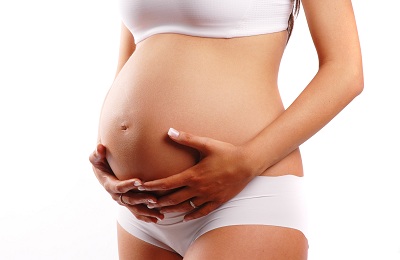
As a rule, BRA, which occurs for biological reasons, is complicated and more difficult to treat. In this case, the CRA is divided into types:

Only a single type of CRA can take place with minimal effort - and it is not the most common. Therefore, in case of suspected CRA, every effort should be made to help the child.
Treatment and prevention of developmental disorders
Correction of CRA implies an integrated approach and the work of a whole team of specialists who can help the child. It includes:
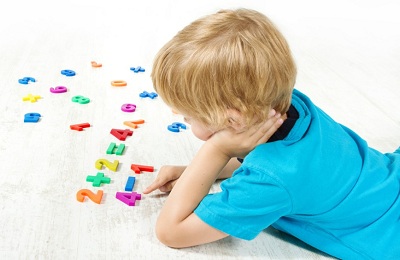
And, of course, the main component is a healthy climate in the family - adequacy, tranquility, acceptance and love. Parents will have to invest in rehabilitation no less than defectologists.
In addition, the CRA can be prevented. For this you need:
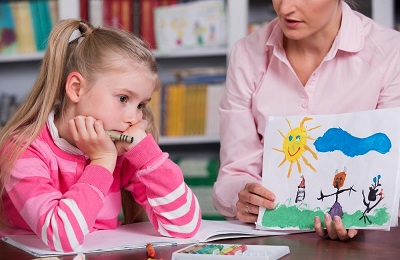
IMPORTANT! For treatment, you will have to make a lot of effort, but if you want to prevent the occurrence of this pathology, you should not go beyond the reasonableness of prevention.
The help of specialists in Evexia with the CRA
Children with CRA should visit rehabilitation centers. For example, the Evexia Clinic, located in Greece, is practicing an integrated approach and its specialists believe that CRA is not a diagnosis with which one can despair.
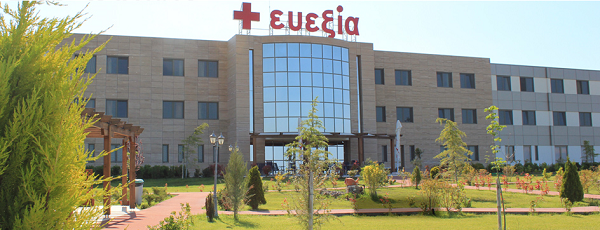
Evexia Rehabilitation Center
Fresh sea air, a wonderful warm climate, the opportunity to get out on a city walk will already benefit the child. In combination with qualified medical care, rehabilitation will have an incredible positive effect.
In the center you can go:
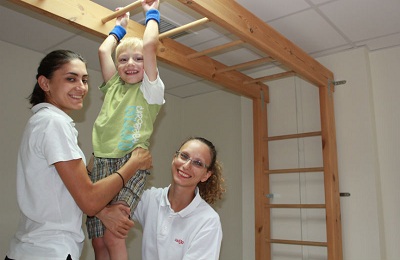
Also, on the basis of the Evexia clinic, children with disabilities in the functioning of the sense organs can correct the work of sensory systems with the help of sensory integration.
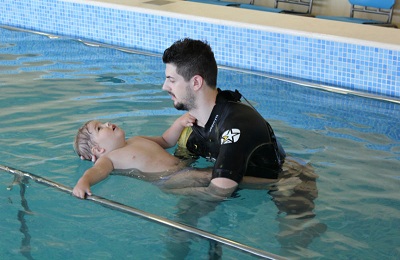 Sensory integration is understood as an adequate, adaptive response of the body to stimuli, which are fixed by the senses.
Sensory integration is understood as an adequate, adaptive response of the body to stimuli, which are fixed by the senses.
In children with disorders of type cerebral palsy, you can adjust the work of the three main types of sensitivity, namely:
- vestibular;
- tactile;
- proprioception.
Rehabilitation should be comprehensive and take place under the supervision of a specialist - therefore a visit to a rehabilitation center is not only desirable, but in fact obligatory.
Do you still think that it is impossible to recover from the STROKE and cardiovascular pathologies !?
Have you ever tried to restore the work of the heart, brain or other organs after suffering pathologies and injuries? Judging by the fact that you are reading this article - you do not know by hearsay what it is:
- frequently occurring discomfort in the head (pain, dizziness)?
- a sudden feeling of weakness and fatigue ...
- there is constantly increased pressure ...
- about dyspnea after the slightest physical exertion and nothing to say ...
And now answer the question: does it suit you? Is ALL these symptoms can be tolerated? And how long have you been "leaked" to ineffective treatment? After all, sooner or later the SITUATION is DECLINED.
That's right - it's time to start ending with this problem! Do you agree? That is why we decided to publish an exclusive method from Elena Malysheva, in which she revealed the secret of the treatment and prevention of STROKES and cardiovascular diseases.
Maturation of the human nervous system occurs most intensely in childhood, so any adverse effect on the child of any external factors can most negatively affect his mental formation. Speaking specifically about mental retardation (CRA), then in its origins may lie a variety of pathological situations that occurred during pregnancy and childbirth, as well as injuries and diseases of the central nervous system in the first years of a baby’s life. Do not equate CRA and mental retardation: timely started treatment will allow the child to acquire the necessary skills for learning and socialize successfully in the children's team. At the same time, only a specialist can determine the type, degree, stage and features of mental development disorders, as well as select the optimal treatment program. In NDC Clinical Psychiatry, differential diagnosis and complex treatment of various types are carried out. CRA. NDC uses the most modern methods of treating children with mental retardationand the available scientific and medical potential of the Center allows achieving the best results.
Diagnosis of mental retardation in the NDC Clinical Psychiatry
First of all, the specialists of the Center will determine whether there is any organic pathology in the brain that could underlie CRA. For this purpose, such instrumental examinations as (CT) and (MRI) are used. With their help, diseases such as hydrocephalus, a brain tumor, cerebral vascular defects, signs of cerebral ischemia, congenital anomalies of the central nervous system, leukodystrophy can be identified. In addition to this, NDC uses such highly selective diagnostic methods as (EEG), echoencephalography (EchoEG), electromyography, Doppler study of cerebral vessels,. Not always in the origins of mental retardation are organic pathology of the central nervous system. In some cases, such a discouraging diagnosis is a consequence of pedagogical neglect, poor care, and an abnormal situation in the family of a child in the first years of his life. In this regard, in the diagnostic examination mandatory participates of the Children's Center.
Treatment of mental retardation in the NDC Clinical Psychiatry
In NDC treatment of CRA It is complex, because doctors from various disciplines, including psycho-neurologists, defectologists, as well as, participate in the therapeutic process. An individual therapeutic program is developed for each patient, the phased and purposeful implementation of which allows to successfully overcome all existing difficulties and guarantees a favorable outcome. treatment of CRA. Along with pharmacotherapy, the Center uses a number of promising methods, including reflex therapy, visual, verbal and auditory stimulation, transcranial magnetic brain stimulation, pedagogical influence,. A great work is being done by defectologist doctors, ensuring an increase in the level of intellectual, social and emotional development of the child. Psychologists of the Center widely use subject-sensory therapy, expanding the vocabulary and conceptual apparatus of the patient. Over the years of the NDC Clinical Psychiatry, thousands of children with mental retardation. The accumulated experience, an integrated approach and the individual character of treatment make it possible to achieve success even in the most difficult clinical cases.
The delay of psychoverbal development (ZPRR) means that for any reason the child has a lag in the speed of mastering coherent speech and “slows down” mental development.
Even more aggravating the problem is the fact that parents often lag behind their children in development, closer to 5-6 years.
This is due to the social activity of children. By this age, they begin to communicate with others more actively than in infancy, master new knowledge, get ready for school. It is then that it turns out that behind a limited vocabulary, words unrelated to sentences that did not seem at all frightening at an early age, there is a delay in mental and intellectual skills.
How to determine ZPRR?
First of all, do not be afraid and be objective. “He is still small”, “he will soon make up” - such phrases will do a disservice. Individual features of development allow deviations from the norm for 2-3-4 months, not more!
Check your child:
- In the year he must say about 10 simple words, know the names of the objects around him.
- By one and a half years, vocabulary increases to 50-60 common words.
- Further, the pace increases - in 1.8 years, up to 180 words are mastered, in 2 years - 300, by 3 years - up to 1000!
- At 2 years old, the child builds simple sentences, uses adjectives and pronouns in speech, asks questions (“who?”, “Where?”), Fulfills the requests addressed to him (“bring, put”).
- At the age of 3, speech already consists mainly of complex sentences, united by meaning. The child knows the names of objects, parts of the body well, easily comes in contact with peers, remembers children's poems and fairy tales.
- By age 5 he speaks almost like an adult, has a large vocabulary. In the sentence uses all parts of speech, forming the correct grammatical forms.
And if the child is lagging behind in development?
The earlier the lag is noticed, the easier it is to correct it. The delay of psychoverbal development in 2-3 years can be fully compensated and the child will go to grade 1 with his friends in the yard. Therefore, parents should be on their guard and hurry to specialists if they are suspected of having a problem.
You can start with a pediatrician. He will assess the overall physiological status of the child and give direction to a neurologist and a defectologist.
Why do you need to hurry?
It is important to accurately determine the cause of the backlog in the formation of speech.
- If the main influencing factor is mental retardation, by itself it is not compensated. Requires medication, active psychological and educational classes. determines the entire psycho-emotional status of the child. He has unstable attention, is subject to frequent changes of emotions, it is difficult to learn. We spoke about the state of mental retardation in a separate article. It is also said that this condition is only a border between the norm and the disease, which means that timely correction will bear fruit.
- Often at an early age in children only speech development lags behind. Mentally and mentally, they are quite healthy. In we wrote about the main features of this condition and about the methods of its correction. The main thing is to start taking action in time. Active work to stimulate the development of speech will help to move the situation from the place and help the child to talk.
- If the RFR is not taken into account, the problem is only aggravated. At an older age, closer to school, the child needs to fully communicate. Social connections, friendship with peers, training and education require full coherent speech. Its absence leads to inhibition of mental development. And then a new state arises, which already requires much more serious efforts to compensate - ZPRR. Delayed psychoverbal development is already a lag, not only in speech, but also in the psycho-emotional sphere. Without correction, this condition will lead to the fact that the child will not be able to study in a regular school with his peers.
Methods of correction of psychoverbal developmental delay
Experts can offer you and your child a variety of ways to compensate. However, it is important to remember that only in the complex they will be able to give a result.
Corrective actions include drug (sometimes) and psychological-pedagogical methods (mandatory).
Medications are prescribed to improve brain function, “build up” neurons, and stimulate the speech center. Despite the fact that they have long been "heard" by many parents who are concerned about the delay in the development of their child, you cannot take them yourself! An appointment is made by a neurologist based on the specific situation.
The defectologist-speech therapist deals with the child, developing his thinking, memory and speech. The correction course includes various lessons that stimulate mental and speech development:
- finger games;
- cerebellar stimulation;
- didactic games for the correction of emotional development;
- attention games, memory stimulation;
- articulation gymnastics, improving sound pronunciation;
- expansion of vocabulary and conceptual stock.
For each situation, its own program of classes is selected based on the characteristics of the child and the requirements of correction.
It is pedagogical work that should be the basis of corrective measures. Parents will have to create at home a favorable environment for the development of the child, complete tasks, play, read and practice. But everything will pay off handsomely. The main thing is not to lose time.
Our center accepts children from 1.5-2 years old - do not miss the opportunity to correct the backlog!
Delayed psychoverbal development is not an independent disease, but a deviation in the development of the CNS and the brain. Various factors can provoke the appearance of such ailment, for example, the diseases that a woman suffered during a child's birth. Contribute to the DPR can also:
- head injuries at an early age;
- chromosomal diseases;
- poisoning and infectious lesions of the mother;
- heavy labor activity.
If the cause of ZPRR - in congenital abnormalities, then its symptoms can occur at a fairly early age. Parents should be concerned if they notice the following first signs of developmental delay in a child:
- the baby is not smiling;
- he does not respond to gestures and words;
- the child constantly keeps his mouth open;
- long does not begin to speak.
In addition, to provoke the emergence of the disease can and acquired diseases. For example, a tumor or cerebral ischemia, leukodystrophy, epilepsy, hydrocephalus can lead to abnormalities. In this case, the first symptoms occur during treatment or rehabilitation of the baby.
It is worth noting that the peculiarities of raising a child can also be the cause of ZPRR. Such problems are characteristic of children growing up under excessive parental care or, on the contrary, experiencing inadequate care and concern. Quite often, developmental delay is observed in children from asocial families.
Serious diseases or disorders of the central nervous system can provoke not only the appearance of deviations in psychoverbal development, but also other disorders. For example, often the disease is accompanied by signs of autism. The following symptoms will indicate such a serious problem:
- frequent bouts of aggression and discontent;
- lack of affection for parents;
- negative attitude to any changes.
Autistic traits also include the child’s refusal to come into contact with people and peers. Children with developmental delays can twist one object in their hands for a long time, walk in a circle or arrange objects in one row.
Pointing to a CRP with autistic traits will also be the difficulty of understanding that the child is experiencing when being approached. He may not fully or partially perceive speech. As a rule, children with autism do not understand how to play toys. However, they may have one favorite subject to which they have affection. Often, these children replace toys with other things, such as cutlery, work tools.
ZPRR with autistic features requires serious and long-term treatment. But you can achieve a good result, if you make an effort. Parents will have to work with the doctors to treat the problem, to devote a lot of time to the child.
Recognize the violation can be, if you closely monitor the child. It is very important to identify the problem as soon as possible. Ideally, the delay should be set between the ages of 2 and 3 years. If you immediately begin treatment for ZPRR, then there are high chances for a quick and complete recovery. In the case when the disease was diagnosed at 5 years or more, the probability of its cure is only 0.2%.
There are certain standards of development, having studied which, parents can understand whether their child has problems. In one year, the baby should already say simple words, to distinguish surrounding objects. Upon reaching one and a half years, his vocabulary should be increased to 50-60 words. Difficulties with the pronunciation of simple phrases may indicate a CRA.
In the future, the speed of development should increase rapidly. Thus, it is considered to be the norm if the child:

- in 1 year 8 months knows up to 180 words;
- in 2 years, says 300 words;
- in 3 years knows more than 1000 words.
The kid can build simple sentences, ask questions and fulfill the requests addressed to him. At the age of 3, a properly developing child finds a good contact with peers, uses all parts of speech. By 5 years the speech should be well delivered. Children at this age should have a large vocabulary.
Diagnostics
Accurately determine that the child ZPRR, can only highly qualified specialist. Therefore, if parents have anxiety and suspicion of developmental delay in a child, then it is worth immediately asking for help from:
- a neurologist;
- a psychologist;
- speech therapist;
- reflexologist.
These specialists are engaged in the diagnosis and treatment of ZPRR. If the problem is suspected in a child up to 6 months, then he is prescribed to undergo neurosonography (NSG). This research is done while the spring is not overgrown. The procedure is carried out to study:
- brain work;
- the state of its structures;
- vascular blood flow.
For infants, on the basis of this study, a treatment for RRD will be developed. This method is based on ultrasonic radiation, so it does not pose a danger to the baby. It is even prescribed to newborns if they suspect brain pathology or birth trauma.
Young patients will be assigned to undergo electroencephalography (EEG). This study has no contraindications and is used to diagnose the state of the brain in children older than 6 months. If the methods did not give a complete picture or their results were not accurate, then additional procedures are assigned. The patient is referred for MRI and CT of the brain.
Treatment of ZPRR at children in the Children's center
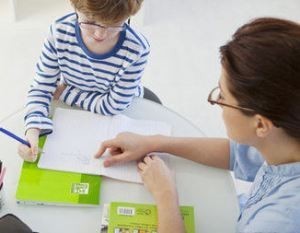
Therapy for this ailment should be complex and begin immediately after the diagnosis. To help cope with such a serious violation can experts of our center. We use modern methods of treatment and diagnosis. The duration of the course depends on the severity of the disorder, the age of the child and his general health.
First of all, the patient will be prescribed drug therapy. As a rule, our doctors recommend 1-2 courses. The patient is prescribed nootropic drugs that:
- improve memory;
- increase mental activity;
- promote better learning
Comprehensive treatment of ZPRR also includes therapeutic massage of the tongue. This is a speech therapy technique that allows for 1-2 courses to improve the pronunciation of sounds. It makes it possible to stimulate the chewing and facial muscles. This procedure is carried out when visiting a speech therapist, sessions with which are also mandatory for the patient.
Helps to quickly deal with impaired physiotherapy. Our specialists appoint 1-2 courses of such procedures for 7-10 sessions to patients with SURR. Physiotherapy activities are selected for each patient individually, given the severity of his condition. To consolidate the effect of treatment prescribed exercise therapy. It is recommended to take 1-2 courses of this therapy for 10-15 procedures.
Also in Moscow, psychiatrists are engaged in the treatment of ZPRR. Such specialists help children develop behavioral and cognitive processes. They allow the child to learn to communicate, to overcome psychological problems.
In some cases, an ENT consultation is prescribed to patients. Help this doctor need, if there is suspicion of hearing loss. As a result, with complex treatment of ZPRR, good results can be achieved in the shortest possible time.
Delayed speech development (ZRR) and delayed psychoverbal development (ZPRR) - these are not independent diseases, but only certain symptoms. At the same time, the prevalence of this diagnosis has recently become an epidemic.
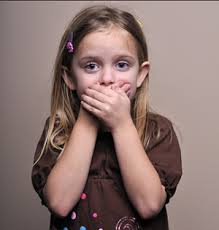
According to research conducted in Tyumen, various speech dysfunctions are recorded in almost 50% of children (aged 1 to 16 years). This percentage increases with age: in children 3 years old, the prevalence of speech dysfunctions is 19%, in children 5 years old - 38%, and in 7-year-olds - more than 50%.
Symptoms of delayed speech development in a child
We list the main ones:
- A child at 4 months does not emotionally respond to adult gestures and does not become animated when his mother addresses him.
- In the 8-9 months does not babble (does not repeat the ba-ba-ba, pa-pa-ta, etc. combinations), a year is extremely quiet and almost does not make sounds.
- At the age of one and a half, he does not speak and does not understand simple words, for example, “mother” or “give”, the names of the surrounding objects. Can not perform simple requests like "come here", "sit down".
- In two years, uses only a few individual words and does not try to repeat new words.
- At 2.5 years in the active vocabulary less than 20 words and word imitations. Does not know the names of the surrounding objects and body parts. At the request can not show on a familiar object or bring something. Can not make phrases of two words (for example, “give water”).
- A three-year-old child can hardly understand even his relatives. He does not speak simple sentences, does not understand simple explanations or stories about events in the past or the future.
- At the age of three, she “rumbles,” that is, she speaks too quickly, swallowing the end of words. Or, conversely, extremely slowly, stretching them, although there is no such example at home.
- In three years he speaks mostly with phrases from cartoons and books, but he does not build his own sentences. Mirror repeats what adults say with him, even to the point.
If a child has a delay in speech development, then his mental development is impaired, and by 5 years the diagnosis usually changes to another: mental retardation.
Causes and classical methods of treatment of ZRR and ZPRR
As a rule, the delay of speech and psychoverbal development is a consequence of disorders of the brain, central nervous system, genetic or mental disorders. But why they arise, and most importantly, why more and more often lately, classical medicine cannot explain.
Drugs that improve metabolic processes in brain cells, microcirculation of the blood, and impulse conduction in nerve fibers are most often prescribed as therapy. Such drugs as Cortexin, Actovegin, Cogitum, Neuromultivitis, Lecithin, really contribute to the restoration of normal functioning of the central and peripheral nervous system.
Often used magnetic therapy, electroreflexotherapy to restore certain areas of the brain responsible for mental and speech development. Sometimes unconventional methods are connected: hippotherapy (treatment with the help of riding and training with horses), dolphin therapy.
An important role is played by the work of the defectologist (psychologist), which is aimed at increasing the mental level of the child’s development. This can be used art therapy (treatment with drawing), muzterapiya (treatment with music), subject-sensory therapy: in the cerebral cortex center of speech and the center of hand motility are located close, and with the development of fine hand motility, the development of the speech center . And, of course, work with a speech therapist is necessary.
Comprehensive treatment by a neurologist, speech therapist and psychologist, as a rule, helps to significantly improve the basic indicators of speech and mental development in general. Nevertheless, classical methods do not reveal and, accordingly, do not eliminate a number of initial violations, which lead to speech underdevelopment. In other words, these methods are not enough.
Osteopathy view on speech and psychoverbal developmental delays
According to studies conducted under the guidance of the Institute of Osteopathy, St. Petersburg State University and the North-Western State Medical University. I.I. Mechnikov, speech disorders in children in 100% of cases are accompanied and, most likely, are the result of structural damage to the skull and spine.
These injuries most often cause problems during pregnancy and childbirth: premature, prolonged or rapid delivery, a long anhydrous period during childbirth, asphyxia during childbirth, birth trauma. And, perhaps, the recent distribution of various methods of stimulation in labor and the popularity of cesarean section, even without medical indications, cause an increase in the number of XRD and ZPRR.
However, the reasons may be different: domestic, sports injuries, sometimes even a light cuff can cause a number of disruptions in the child’s brain. The result is the same: different areas of the brain begin to work incorrectly or not actively enough. Delays in speech and mental development mean that the areas responsible for speech and intelligence have been affected.
And here it is important to know: structural, mechanical damage to the skull and spine is simply impossible to eliminate with the help of drugs, psychotherapy or speech therapy. They can be corrected only physically, manually. This is exactly what osteopathy does - human mechanics.
Osteopathic approach in the treatment of ZRR and ZPRR
An osteopathic physician, upon examination, reveals zones in a child that are damaged as a result of childbirth or other causes and affects them, restoring their correct position and restoring their freedom of movement. As a rule, these are the areas that are most injured during childbirth, namely: 1-2 cervical vertebra, cervico-thoracic spine, occipital-temporal sutures, intraosseous injuries of the occipital bone itself, the main seam in the skull.
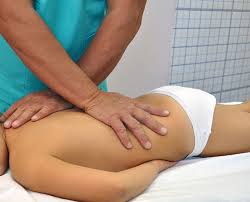
As a result, the function of the bone, nervous system and blood supply is restored. Microcirculation of blood and metabolism in brain cells is normalized. As a result, the brain nutrition improves, its work is normalized, the behavior and speech changes. In my practice, the effectiveness of osteopathic treatment for delayed speech and mental development is 70%. There are documented statistics.
Study of the effectiveness of osteopathic treatment of children with speech underdevelopment
Institute of Osteopathy St. Petersburg State University and SZGMU them. I.I. Mechnikov, together with the Speech Development Center in Tyumen, conducted a study of children with a diagnosis of dysarthria - a general underdevelopment of speech *. Half of the children (control group) underwent classical treatment by a neurologist, a speech therapist and a psychologist, and half (experimental) - by a speech therapist and osteopath. Three months later, a comprehensive examination showed that osteopathic treatment was more effective than medication.
In the experimental group receiving osteopathic treatment, all indicators were better: emotional arousal decreased in 78% of children (56% in the control group), restlessness - in 61% (45% in the control group), speech disorders - in 89% (72% in the control group). Absolutely all children of the osteopathic group improved their independent speech and the state of their speech apparatus (compared with 94% and 78% of children in the control group).
Psychoverbal development improved in 72% (61% in the control group), intelligence increased in 56% (45% in the control group), attention increased in 45% (33% in the control group).
At the same time, children who were treated with osteopaths naturally decreased in the number of disorders at the level of body structures. This allows us to hope that in the future their development will be more harmonious.
* Based on the article “Osteopathic treatment of children with speech underdevelopment” in the Russian Osteopathic Journal No. 3-4 for 2012.
Patient Reviews
I want to thank Natalia Sergeyevna for the work with my daughters. We went to the clinic because the youngest did not turn over at 5 months and was lazy to lie on her stomach, although at 3 months a course of treatment was completed and there were no complaints from neurologists. And the eldest daughter, in her 3 years with flawless speech and good development, had difficulties in activities requiring the coordinated work of her arms and legs (put on socks, ride a bicycle, catch a ball with both hands, etc.). Lyudmila
- Doctor: Sherstenikina Natalia Sergeevna
Psychotherapist, osteopath
I thank Dr. Michel Dobensky and the Ostmed Clinic (many thanks to the sensitive, kind and helpful staff) for helping my triplets children. Kids were born at 25 weeks gestation (Kohl, Kostya and Pasha), each in connection with the early appearance of health problems. During three sessions, Pasha's hearing was normalized, with a diagnosis of neurosensory hearing loss of 4 degrees; with hearing aid did not respond to sounds. Now the child does without him. Helena
- Doctor: Michel Dobensky (MICHEL DOBENSKY)
Doctor of osteopathy.
The son of the CRA, behavioral disorders, he is 5.3 years old. After each session, a huge positive change was observed in the son: the speech became better, the behavior returned to normal. Dina
- Doctor:
Thank you very much to the doctor and clinic Ostmed. We are tired of going to the doctors, undergo endless little useful procedures. Svetlana Ivanova
At the age of 2, he had a large operation for intestinal obstruction, he speaks ill. After 3 receptions at the osteopath Titov Igor Viktorovich, the chair returned to normal. After the 2nd reception, the child suddenly began to speak in phrases when he did not speak at all. Catherine
- Doctor: Igor Titov
Osteopathic doctor, thoracic surgeon, pediatrician
Krasovskaya Elena Olegovna - just a miracle osteopath. My child has CRA (5 years). I went to her only 3 times, and already a significant leap in the development of my child. Dina
- Doctor:
Professional! The result after his treatment is simply amazing. How many went to the doctors, no one could help us, and Jean, helped! After treatment, the daughter became active, began to respond to objects, stopped crying. It even seems to me that the movements have become different. We, very satisfied, will continue to treat him. Many thanks to the Ostmed clinic for the excellent doctors! Anonymous
- Doctor: Jean Fansello (JEAN FANCELLO)
Master of European Osteopathy
Answers on questions
Mila: Hello. Son 3 years and 3 months. Very poor speech and poor understanding of the speech. There is aggression. Hysteria Bad sleep. Sometimes afraid of new places. Contacts with adults is not bad. Maybe even kiss outsiders. Unless, of course, in the mood. No perseverance and attention scattered. Appetite is changeable ..Doctor's Answer:
Good day! Of course, the number and frequency of visits without inspection will not work. But I think it will be enough to visit an osteopath once every 2-3 weeks. Maybe 1 time per month. How long? It depends on many factors and is very individual. Maybe a few years, with breaks, of course. Or maybe less, several times. It is necessary to look at the child, even one procedure can change a lot!
RaisaA question for my child: a girl of 6.5 years old. Childbirth: asphyxia, weak labor. What worries: flat-valgus feet, we sleep in a diaper (we can also pee in panties during the day), ZPRR, disinhibition, ADHD, we do not speak in sentences in which more than 3 words, not assiduity, not instructing. Please write if osteopathy treatment is possible ?.
Doctor's Answer:
Hello Raisa! From your description it can be concluded that the child has the effects of birth trauma. To clarify the diagnosis is very important as was the pregnancy, childbirth, the first year of a child's life, its development until today. An osteopath can help your child. However, it is possible to determine the quantity, frequency and which osteopathic techniques to apply only with personal consultation.
Respectfully,
Please note: required fields are marked with an asterisk (*).
- Delayed psychoverbal development (wile) in children - the child’s lag in development
- Social situation of development in infancy
- Hyde on the mission of passing the Kings of the road in Batman: Arkham Knight
- The program of individual support of children of primary classes in the conditions of (special) correctional boarding school VII-VIII species
- How many vowel sounds in Russian - we study the Great and Mighty
- What vowels are soft. Hissing letters
- Periodization of child development

 Live journal
Live journal Facebook
Facebook Twitter
Twitter